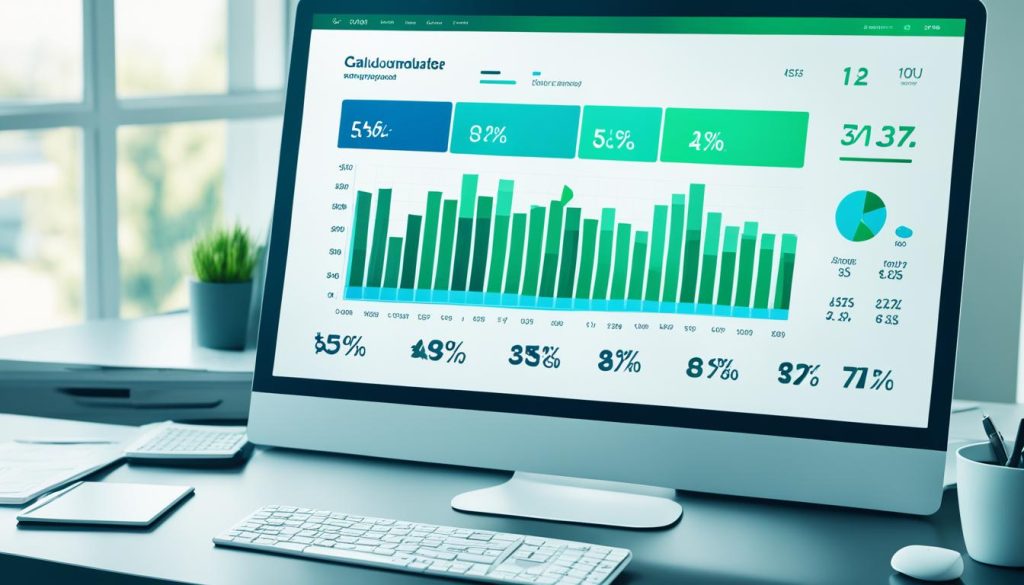Refinance calculators are great for checking out your loan options. They let you see how your current loan compares to a new one. This helps you make a smart choice1. When you refinance, you get a new loan with better terms to pay off the old one. This can save you money, give you access to your home’s equity, lower your monthly payments, or help you pay off debt faster1.
Key Takeaways
- Refinance calculators help you compare your existing loan with potential refinanced options.
- Refinancing can provide benefits like lower interest rates, access to home equity, and simplified payments.
- Refinancing can be advantageous for borrowers struggling with minimum payments or seeking to pay off their loans faster.
- Refinancing costs, such as closing fees and appraisal charges, should be factored into the decision-making process.
- Refinance calculators can estimate the potential savings and break-even point to determine if refinancing is the right choice.
What Are Refinance Calculators?
Refinance calculators are tools that help you see if refinancing your loan could save you money. You can enter details like your current loan’s interest rate, term, and balance. Then, you can look at new loan options that might save you cash2.
Understanding Loan Refinancing
Loan refinancing means getting a new loan to replace your old one. It often has different terms and conditions. People refinance for reasons like getting a lower interest rate, using home equity, reducing payments, or paying off the loan faster. These calculators show if refinancing is a good move for you2.
Reasons to Refinance
- Lower interest rate: Refinancing can get you a lower interest rate, saving you thousands over the loan’s life2.
- Access home equity: It lets you use your home’s equity for other needs2.
- Reduce monthly payments: A lower interest rate or longer term means smaller monthly payments2.
- Shorten loan term: If your finances have gotten better, refinancing to a shorter term can help you pay off your mortgage quicker2.
- Consolidate loans: Refinancing can merge multiple loans, like your mortgage and a home equity loan, into one with better terms2.
Refinance calculators let you see these and other ways refinancing could benefit you. They help you make smart choices about your financial future2.
Mortgage Refinancing Using Calculators
Refinance calculators are great for exploring different mortgage refinancing options. They help you see the costs and benefits of various refinances. This lets you make a choice that fits your financial goals.
Cash-Out Refinance
A cash-out refinance lets you use your home’s equity for cash. This is good if you need money for home improvements or to pay off debt. Calculators show how much you could save each month and the cash you might get, based on your home’s value and your loan details3.
You usually need 20% equity in your home for this refinance type, but some programs may allow less3. Refinancing can lower your monthly payments, interest rates, or loan term. You might also get cash back or stop paying private mortgage insurance3.
FHA Refinance
An FHA refinance can switch you from an FHA loan to a regular one, possibly saving you from paying mortgage insurance. Calculators help figure out if this is a good move, looking at your current loan and interest rates3. For FHA loans, you must wait a year before refinancing for cash3.
Rate and Term Refinance
A rate and term refinance aims to lower your interest rate or change your loan term for smaller monthly payments. Calculators let you compare your current loan with possible new options3. A small change in interest rates can greatly affect your monthly payments3.
Switching from an adjustable-rate to a fixed-rate mortgage can help with budgeting3.
It’s key to think about the costs and when you’ll break even with a refinance. Calculators give you the info you need to make a smart choice for your finances4. Refinancing can cost up to 6% of your loan’s balance4. It might take about 35 months to break even on a $300,000, 20-year mortgage with $9,000 in costs4.

Using refinance calculators helps you look at your options and make a choice that fits your financial goals5. Whether it’s a cash-out, FHA, or rate and term refinance, these tools offer valuable insights5. Refinancing can cost 2% to 6% of your loan amount5. If interest rates have dropped, a cash-out refinance could lead to a lower monthly payment5.
| Refinance Type | Potential Benefits | Considerations |
|---|---|---|
| Cash-Out Refinance |
|
|
| FHA Refinance |
|
|
| Rate and Term Refinance |
|
|
Looking at different refinance options and their pros and cons with calculators helps you make a smart choice for your financial goals5. LendingTree lets you compare cash-out refinance offers and current rates from various lenders5.
Refinance Calculators: Mortgage Refinance Costs
When using refinance calculators, it’s key to look at the costs of mortgage refinancing. These costs include things like application fees, appraisal fees, and other closing costs6. These fees usually make up 3% to 6% of the loan’s amount6. The calculator helps figure out these costs so you can see if refinancing will save you money overall.
Refinancing often aims to get lower interest rates or a fixed-rate mortgage6. It can also help you secure a stable rate6. Sometimes, people refinance for a cash-out refinance, which lets them use their home’s equity for other needs6.
Deciding to refinance should consider things like lower interest rates, home value increases, or having a 30-year mortgage that’s young6. But, it might not be a good idea if your credit score is down, closing costs are too high, you’re moving soon, or there are prepayment penalties6.
Figuring out the break-even point is key to seeing if refinancing is worth it6. For example, refinancing might cost $4,280 but save you $75 a month, making it break even after 57 months6. If you plan to stay in your home over five years, refinancing could save you money on monthly payments and total interest.
Some lenders offer no-cost refinancing, adding the costs to your loan’s principal6. Cash-out refinancing can also help pay off high-interest debt with a lower mortgage rate6. In some cases, you might not need an appraisal for refinancing7.
- Total savings over the next 7 years from refinancing: $20,493.63
- Monthly payment savings after refinancing: $-386.40
- Interest savings over 7 years from refinancing: $35,336.95
- Tax savings difference before and after refinancing: $10,601.08
- Remaining loan balance difference at sale after 7 years from refinancing: $67,794.60
| Refinance Costs | Details |
|---|---|
| Average Closing Costs | 2% – 6% of loan amount |
| Common Refinance Fees | Lender fees, credit report, appraisal, title search, transfer taxes, escrow fees, and others |
| Credit Score Requirement | 620 or greater, higher scores of 740 or more receive more favorable rates |
| Refinance Break-Even Point | Reduction in total interest paid must be greater than the cost of acquiring the loan |
| Loan Term Changes | Refinancing usually resets the length of the mortgage to 15 or 30 years |
| No Closing Cost Refinances | Closing costs rolled into the loan, increasing the total amount borrowed and monthly payments |
Refinance calculators are great tools for understanding mortgage refinancing costs. By looking at these costs early, you can decide if refinancing is a smart move for you.
Refinance Calculators for Student Loans
Refinance calculators are great for looking into student loan refinancing. Refinancing federal student loans might mean losing some benefits, but it can save money on private or PLUS loans with high interest rates9. These calculators show if refinancing to a loan with a lower interest rate and easier monthly payments could save you money.
When Student Loan Refinancing Makes Sense
Refinancing can get interest rates on private student loans under 5 percent if you have good credit9. If your loans have rates over 6 percent, refinancing could help9. It makes managing your loans easier by combining them into one, with one interest rate and payment date9. But, you’ll need to show you’re financially stable to qualify9.
Remember, turning federal student loans into private ones through refinancing means losing federal benefits like income-driven repayment plans and forgiveness9. Refinance if it cuts your total interest, lowers your monthly payments, or gives you a better rate than your current loan9. A strong credit score can also help you get better refinancing terms9.
To find the best refinancing deal, prequalify with several lenders9. This lets you compare rates, terms, fees, discounts, and hardship programs9. If you’re having trouble getting refinanced on your own, a co-signer with good credit might be needed9. Once approved, the new loan funds usually arrive in a few weeks, letting you pay off your old loans with the new terms9.

Refinancing can be a smart financial step, but think it over carefully. Use refinance calculators to help you make a choice that fits your financial goals9.
Refinance Calculators
Refinance calculators are great tools for figuring out if refinancing your mortgage or student loans is a good idea. They look at your current loan details like interest rate and term. Then, they let you see how different refinancing options could change your monthly payments, total interest, and savings.
With these calculators, you can check out various refinancing choices. This includes lower interest rates, shorter loan terms, or cash-out refinancing. This helps you decide if refinancing fits your financial situation10.
These calculators also think about closing costs, the break-even point, and how it might affect your credit score. By using your loan details, you can see the good and bad sides of refinancing. This helps you make a smart choice before acting11.
Looking to lower your mortgage payments, stop paying PMI, or use home equity for other needs? A refinance calculator is a key tool. It lets you try out different scenarios to see which one meets your financial goals10.
| Key Refinance Considerations | Potential Impact |
|---|---|
| Lowering monthly payments | 10 Percentage of homeowners choosing to refinance to lower their monthly payment. |
| Stopping private mortgage insurance (PMI) | 10 Percentage of individuals refinancing to stop paying for private mortgage insurance (PMI). |
| Switching to a longer loan term | 10 Percentage increase in interest payment if refinancing to a longer-term loan. |
| Switching to a shorter loan term | 10 Percentage reduction in interest paid by switching to a shorter loan term. |
| Cash-out refinancing for debt consolidation or home improvements | 10 Percentage of homeowners using cash-out refinance to pay off high-interest debt10, proportion of homeowners seeking cash-out refinancing for home improvement projects, and10 amount of equity typically leveraged by homeowners for cash-out refinancing. |
Refinance calculators are a big help in planning your finances. They give you the info you need to decide if refinancing is right for you. By knowing how it could change your payments, interest costs, and finances, you can make a smart move. This way, you can reach your financial goals with confidence11.

Factors to Consider Before Using Refinance Calculators
When thinking about refinancing your mortgage, it’s important to look at several key factors. These include the break-even point and the costs of refinancing1213.
Break-Even Point
The break-even point is how long it takes for your savings from refinancing to cover the upfront costs13. Knowing this can help you decide if refinancing is a smart move, especially if you plan to stay in your home for a long time13.
Refinancing Costs
Refinancing comes with costs like origination fees, appraisal fees, and home inspection fees13. These can add up fast, possibly canceling out the savings from a lower interest rate or shorter loan term14. It’s key to know the total cost of refinancing and compare it to the long-term benefits before deciding14.
Think about your current loan terms, expected savings, and future plans before deciding to refinance12. A refinance calculator can give you useful insights. But, it’s also important to understand the break-even point and total costs of refinancing1213.

“Refinancing can substantially reduce monthly mortgage payments if current rates are lower than the rate on the existing loan.”12
| Refinancing Consideration | Key Factors |
|---|---|
| Break-Even Point |
|
| Refinancing Costs |
|
By thinking about the break-even point and total costs, you can make a smart choice about using a Refinance Calculators. This is important for your financial situation121413.
Conclusion
Refinance calculators are key tools for understanding mortgage refinancing. They help you find the best loan for your financial goals. Knowing about LTV ratio, refinancing costs, and break-even points is crucial for making smart choices15.
These calculators are great for lowering interest rates, cutting down monthly payments, or tapping into home equity. But remember, your refinance success depends on your credit score, income, and the market conditions1617.
Use refinance calculators wisely and think about all the factors. This way, you can confidently go through the refinancing process. Look at your options, do the math, and start moving towards a more secure financial future.
FAQ
What are refinance calculators?
Refinance calculators help you see if refinancing your loan is a good idea. You can enter details about your current loan and check out new loan options. This includes interest rates, loan terms, and cash-out amounts.
What are the key reasons to consider refinancing?
You might want to refinance for several reasons. These include getting a lower interest rate, using home equity, lowering your monthly payments, shortening your loan term, or combining several loans into one.
What types of mortgage refinancing can refinance calculators help with?
Calculators are great for exploring different mortgage refinancing options. This includes cash-out refinances, FHA refinances, and rate and term refinances.
What costs are associated with mortgage refinancing?
Refinancing a mortgage comes with costs like application fees, appraisal fees, and origination fees. There are also title search and insurance, recording fees, and other closing costs. A calculator can estimate these costs to see if refinancing saves you money overall.
When does student loan refinancing make sense?
Refinancing might be smart for private or PLUS loans with high interest rates. A calculator can show if refinancing to a lower rate and easier payments saves you money.
What factors should I consider before using a refinance calculator?
Think about your break-even point and the total costs of refinancing before using a calculator. The break-even point is when your savings cover the upfront costs of refinancing. Knowing this helps you decide if refinancing is a good financial move for you.
Source Links
- Refinance Calculator
- Refinance Calculator – Should I Refinance?
- Refinance Calculator | New American Funding
- Mortgage Refinance Calculator
- Cash-Out Refinance Calculator | LendingTree
- Refinance Closing Cost Calculator – Estimate Your Costs | Home Lending
- Current Mortgage Loan Refinancing Rates
- Refinance Calculator – Should I Refinance? | Zillow
- Student Loan Refinance Calculator | Bankrate
- Mortgage Refinance Calculator | Quicken Loans
- Mortgage Refinance Calculator: Should You Refinance?
- Mortgage Refinance Calculator | Should You Refinance?
- Mortgage Refinance Savings Calculator | American Financing
- Should I Prepay Mortgage or Refinance Calculator – HSH.com
- Consolidate First & Second Mortgages With a Low-rate Refi
- Should You Refi Your Home Loan?
- Home Mortgage Refinance Calculator – Capital Bank

